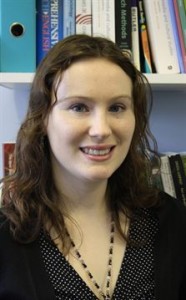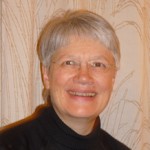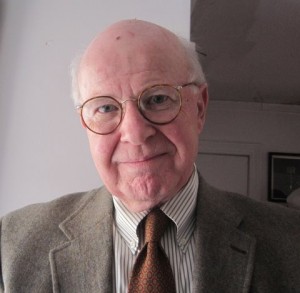The Phenomenology of Religion
Phenomenology is an important methodology in the study of religions, but can be inaccessible to the student. In this interview, James Cox outlines the phenomenology of religion to David in a clear, concise way, avoiding jargon and placing the methodology in the broader context of the history of European philosophy and comparative religion.
Cox's latest and most complete work on the subject is An Introduction to the Phenomenology of Religion (2010), published by Continuum. A review which questions his relating phenomenological and cognitive approaches by Paul Tremlett in Culture and Religion 11/4 (2010) is available here. Also recommended is his earlier A Guide to the Phenomenology of Religion (2006), also published by Continuum. His 2008 article from DISKUS, the BASR journal, "Community Mastery of the Spirits as an African Form of Shamanism" applies the phenomenological method to certain African practices in order to argue for Shamanism as a universal category. If you are interested in what Professor Cox had to say about the development of Religious Studies more broadly, we heartily recommend From Primitive to Indigenous: The Academic Study of Indigenous Religions (Ashgate, 2007). It is simultaneously an account of colonial contact with indigenous religions, a history of how scholars have conceptualised religion, and an attempt to create a new definition of "religion".
A transcription of this interview is also available as a PDF.
Cognitive Approaches to the Study of Religion
The cognitive study of religion has quickly established itself as the paradigmatic methodology in the field today. It’s grounded in the concept that religiosity is natural because it is well adapted to the cognitive propensities developed during the evolution of our species. In this episode, Professor Armin Geertz tells Chris why it deserves its prominent profile, and how it is developing.
What we’re learning from the cognitive study of religion.
This interview was recorded at the European Association for the Study of Religions' Annual Conference in Budapest in September 2011. Out of necessity it was not recorded on our normal equipment, and we apologise for the poorer quality of the sound this week.
Invented Religions
What is an "Invented Religion"? Why should scholars take these religions seriously? What makes these “inventions” different from the revelations in other religions? What happens when an author does not want their story to become a religious text?
In this interview with David, Carole M. Cusack (Associate Professor in Studies in Religion at the University of Sydney) answers these questions and more, exploring her notion of “Invented Religions” and introducing the listener to a wide variety of contemporary and unusual forms of religion. Discussion flows through a range of topics – from Discordianism and the Church of the Flying Spaghetti Monster to Scientology, Jediism and the New Atheism – and demonstrates how the works of authors such as Thomas Pynchon and Robert A. Heinlein can be transformed by others and take on a life of their own. In her own words, “This is a fiction so good it should be true…”
[N.B., Carole asked us to let you know that when she said that George Adamski founded the Aetherius Society, she meant George King. Both Georges encountered Venusians in 1954, but Adamski was in the US and King in the UK. A forgivable error, we're sure.]
A transcription of this interview is also available as a PDF, and has been pasted below.
Of particular relevance to the topic of this interview is Carole's article
Science Fiction as Scripture: Robert A. Heinlein’s Stranger in a Strange Land and the Church of All Worlds in Christopher Hartney, Alex Norman, and Carole M. Cusack (eds.), Creative Fantasy and the Religious Imagination, special issue of Literature & Aesthetics, Vol. 19, No. 2, SSLA, 2009, pp. 72-91. The full text is available here. If you have access to the International Journal for the Study of New Religions, you may also find the following article of interest: Discordian Magic: Paganism, the Chaos Paradigm and the Power of Parody, International Journal for the Study of New Religions, Vol. 2, No. 1, May 2011.
The Relationship between Theology and Religious Studies
Our interview this week features Chris speaking to Professor Donald Wiebe from the Faculty of Divinity at Trinity College in the University of Toronto on the relationship between Theology and Religious Studies.
Ed. note. Out of necessity this interview was not recorded on our normal equipment, and we apologise for the poorer quality of the sound this week.
The relationship between Theology and Religious Studies is not a simple one. David Ford writes that at its broadest, theology is thinking about questions raised by and about religions (2000:3). These questions are largely directed towards notions of transcendence (typically gods), incorporate doctrinal issues and are “essentially a second-order activity arising from ‘faith’ and interpreting faith” (Whaling, 1999:228-229). Essentially, theology is thinking about religion from within religion - although when most people refer to "Theology", what they mean is "Christian Theology".
It is generally accepted—at least as far as most academics are concerned—that there is a distinct difference between religious studies and theology. This is succinctly summarised by Ninian Smart’s statement that “historical and structural enquiries, such as sociology, phenomenology, etc., [...] are the proper province of [the study of] Religion, and the use of such materials for Expressive ends [...is] the doing of Theology” (in Wiebe, 1999:55).
As you shall see from this interview, however, things are much more complicated, and Professor Wiebe is particularly qualified to present his own take on the relationship between these two distinct disciplines. His primary areas of research interest are philosophy of the social sciences, epistemology, philosophy of religion, the history of the academic and scientific study of religion, and method and theory in the study of religion. He is the author of a number of books, including Religion and Truth: Towards and Alternative Paradigm for the Study of Religion (1981), The Irony of Theology and the Nature of Religious Thought (1991), and, of particular relevance to this interview, The Politics of Religious Studies: The Continuing Conflict with Theology in the Academy (1999). In 1985 Professor Wiebe, with Luther H. Martin and E. Thomas Lawson, founded the North American Association for the Study of Religion, which became affiliated to the IAHR in 1990; he twice served as President of that Association (1986-87, 1991-92).
This interview was recorded at the European Association for the Study of Religions‘ Annual Conference in Budapest in September 2011, where Professor Wiebe also presented a particularly relevant paper with his colleague Luther H. Martin, entitled "Religious Studies as a Scientific Discipline: The Persistence of a Delusion". Out of necessity it was not recorded on our normal equipment, and we apologise for the poorer quality of the sound this week.
Jonathan Z Smith: “[R]eligion is an inextricably human phenomenon. […] Religious studies are [therefore] most appropriately described in relation to the Humanities and the Human Sciences, in relation to Anthropology rather than Theology. What we study when we study religion is one mode of constructing worlds of meaning, worlds within which men find themselves and in which they choose to dwell.” (1978, Map is Not Territory, 290)
References:
- Ford, David F. (2000 [1999]). Theology: A Very Short Introduction. Oxford: Oxford University Press.
- Whaling, Frank (1999). “Theological Approaches” in Peter Connoly (ed.), Approaches to the Study of Religion. London: Cassell, pp. 226-274.
- Wiebe, Donald (1999). The Politics of Religious Studies: The Continuing Conflict with Theology in the Academy. New York: St Martin’s Press.
Animism
Animism is often taken as referring to worldviews in which spirits are to be found not only in humans, but potentially in animals, in plants, in mountains and even natural forces like the wind. It was of central importance in early anthropological conceptions of religion, most notably in the work of E. B. Tylor. More recently, however, Graham Harvey has challenged the traditional conception of animism, seeking to understand it as "relational epistemologies and ontologies"; in other words, it is a way of living in a community of persons, most of whom are other-than-human.
The Insider/Outsider Problem
The Insider/Outsider problem is one of the most perennial problems in the academic study of religion. This distinction, relating to where scholars position themselves relating to the subject matter (whatever that may be), permeates not only almost every aspect of academia, but has profound implications for each and every one of us conducts ourselves in relationship with the other people we encounter in our day-to-day lives. Dr George Chryssides joins Chris this week to discuss this fascinating issue.
This interview was recorded in September 2011 at the British Association for the Study of Religions' Annual Conference, hosted by Durham University.
Youth, Sexuality and Religion
 The Religion, Youth and Sexuality: A Multi-faith Exploration project, based at the University of Nottingham, looked at 18 to 25 year-olds from a variety of faith backgrounds in order to understand attitudes and practices around sexuality and how this was negotiated in relation to religious traditions. Dr Sarah-Jane Page, one of the research fellows, talks to Chris about the project's findings, which were sometimes surprising. Religion is found to be a significant influence, but one influence among a number of others.
The Religion, Youth and Sexuality: A Multi-faith Exploration project, based at the University of Nottingham, looked at 18 to 25 year-olds from a variety of faith backgrounds in order to understand attitudes and practices around sexuality and how this was negotiated in relation to religious traditions. Dr Sarah-Jane Page, one of the research fellows, talks to Chris about the project's findings, which were sometimes surprising. Religion is found to be a significant influence, but one influence among a number of others.
About Dr. Page
Dr Page completed her doctorate in 2009, in the School of Sociology and Social Policy at the University of Nottingham, investigating motherhood and priesthood as well as the non-ordained spouses of women priests in the Church of England. More recently, she was Research Consultant for the European Commission funded project, Citizens in Diversity: A Four-nation Study of Homophobia and Human Rights (www.citidive.eu). The British case study, with which she was involved, focused on ascertaining types of homonegativity encountered in the UK context, in order to understand the complexities and nuances relating to contemporary attitudes to homosexuality. She is now based at Aston University.
A .pdf of the full findings of the Religion Youth and Sexuality project can be downloaded here, and a podcast about the research is also available. Dr Page has also co-authored a book (with A. K. T. Yip) based on the research which will be published by Ashgate during 2012, entitled Religious and Sexual Journeys: A Multi-faith Exploration of Young Believers.
The Changing Nature of Religion
 In her keynote address to the Society for the Scientific Study of Religion in Milwaukee last October, Grace Davie eruditely portrayed the changing perceptions of 'religion' over the last fifty years. In the 1960s, most sociologists consciously or unconsciously bought into idea of the 'death of god' - religion became effectively invisible to academia. Throughout the 1980s and 90s, a number of events - most notably the 'Satanic Verses' controversy - dramatically increased the 'visibility' of religion: it became a political problem. Now, in the 21st century, religion is increasingly being construed by politicians, educators, the media etc, as a useful resource to be exploited. These public perceptions are but one facet of the way in which 'religion' can be understood as 'changing'.
In her keynote address to the Society for the Scientific Study of Religion in Milwaukee last October, Grace Davie eruditely portrayed the changing perceptions of 'religion' over the last fifty years. In the 1960s, most sociologists consciously or unconsciously bought into idea of the 'death of god' - religion became effectively invisible to academia. Throughout the 1980s and 90s, a number of events - most notably the 'Satanic Verses' controversy - dramatically increased the 'visibility' of religion: it became a political problem. Now, in the 21st century, religion is increasingly being construed by politicians, educators, the media etc, as a useful resource to be exploited. These public perceptions are but one facet of the way in which 'religion' can be understood as 'changing'.
In this interview with Chris, Professor Davie discusses the place of religion in modern Europe, paying particular attention to the place of the United Kingdom within the European context. In an effort to combat the caricatures that typify media accounts of religion in the contemporary world, Davie discusses the changing nature of religion, in academia and in the public square, and considers the impact of the arrival of new cultures into Europe, whilst reflecting on secular reactions to these.
Three freely accessible articles by Prof. Davie which should be of interest to our listeners are "Thinking Sociologically about Religion: A Step Change in the Debate?", published by The ARDA in 2011, "Is Europe an Exceptional Case?" from The Hedgehog Review (2006), and "Working Comparatively" from the University of Kent's Research Methods for the Study of Religion website.
This interview was recorded in October 2011 in Milwaukee, WI at the annual meeting of the Society for the Scientific Study of Religion.
Substantive Religion and the Functionalist Sacred
Could the difficulties associated with the academic conceptualisation of "religion" be overcome by changing our focus instead to "the sacred"? Jay Demerath tells Chris why we should define religion substantively - that is, in terms of specific attributes like rituals, deities or dogmas - but the sacred in terms of the function it serves in the lives of individuals and cultures. From this perspective, religion can be considered one of a number of potential sources of the sacred.
Jay Demerath is currently the Emile Durkheim Distinguished Professor of Sociology Emeritus at the University of Massachusetts, Amherst, where he has been a faculty member since 1972, including ten years as Chair. Prior to UMass, he received a 1958 A.B. from Harvard and a 1964 Ph.D from the U. Of California, Berkeley before rising from Instructor to Professor at the University of Wisconsin, Madison and serving as Executive Officer of the American Sociological Association. Among his many publications, he is author or editor of fourteen books, including the award-winning Crossing the Gods: World Religions and Worldly Politics (2001) and the recent Sage Handbook for the Sociology of Religion (2008). The current Chair-elect of the Religion Section of the American Sociological Association, he is also past-President of the Eastern Sociological Society, the Society for the Scientific Study of Religion, and the Association for the Sociology of Religion.
Of particular relevance to this interview is his paper from 2000, The Varieties of Sacred Experience: Finding the Sacred in a Secular Grove, from the Journal for the Scientific Study of Religion, 39, p. 1–11. Here's the abstract:
This paper contends that the social scientific study of religion has long labored under a chafing constraint and a misleading premise. It suggests that our primary focus should be on the sacred, and that religion is just one among many possible sources of the sacred. Defining religion “substantively” but the sacred “functionally” helps toresolve a long-standing tension in the field. Broadened conceptions of the sacred and of “sacralization” help to defuse the conflict among the two very different versions of secularization theory: the “all-or-nothing” versus the “middle range.” Meanwhile, a conceptual typology of the sacred pivots around the intersections of two distinctions (compensatory vs. confirmatory and marginal vs. institutional). This generates four distinct scenarios: the sacred as integrative, the sacred as quest, the sacred as collectivity, and the sacred as counter-culture. The paper concludes with three admonitions for research in the area.
What is the Future of Religious Studies?
This week we decided to do something a bit different. Every time David and Chris have conducted an interview, they have been asking the interviewees an additional question: "What is the Future of Religious Studies?"
The result is this highly stimulating compilation of differing perspectives and levels of optimism on what has become one of the most hotly debated topics in the academic study of religion at the start of the second decade of the twenty-first century.


